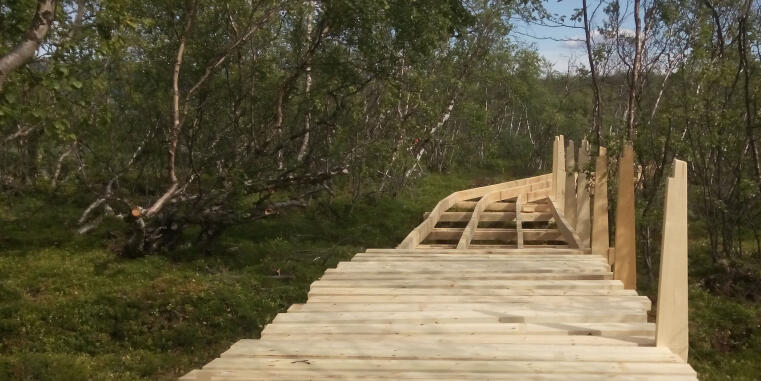

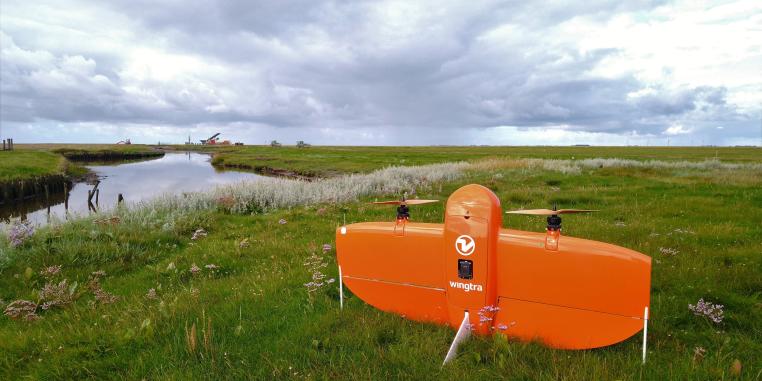
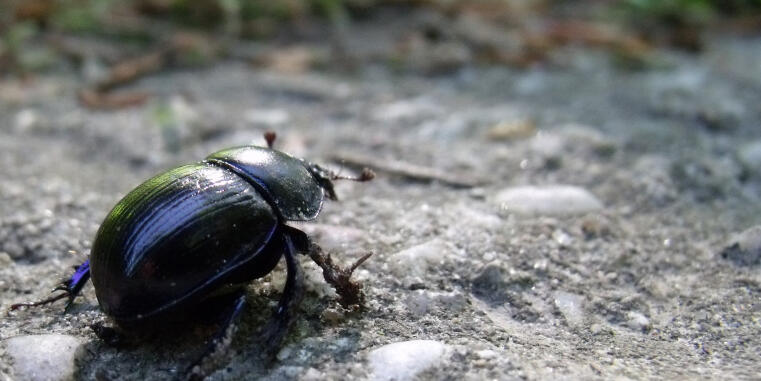




The Applied Landscape Ecology/Ecological Planning working group (AG Buttschardt) researches the effects of human ways of life and land use on the natural and landscape environments and how these can be designed to achieve a regenerative development of landscapes. We assume that landscapes are the spatial representation of socio-ecological systems that can only be fully understood in an interdisciplinary approach. In order to take into account the applied aspect of ecological planning, our research is increasingly transdisciplinary and explicitly includes the noosphere. We therefore cooperate with interdisciplinary centres (e.g. the ZIN or the Brazil Centre), other Universities (e.g. Münster University of Applied Sciences) and practitioners (see links). Our work focuses on Integrated Natural Resources Management, with specific specialisations in Limnology/River restauration, Agroecology and modern agroforestry systems.
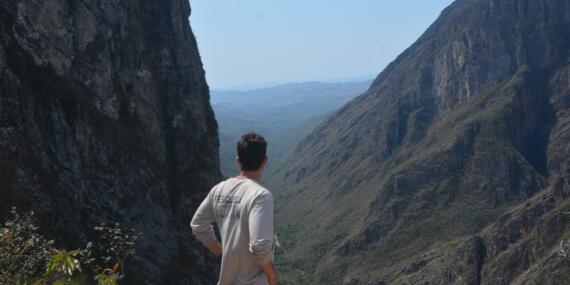
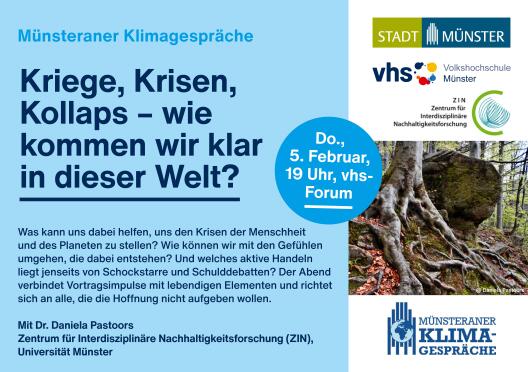
Every day, we are bombarded with news that we can hardly believe. Yet another piece of terrible news – and then another, and another. In many cases, we are unable to truly take in the information, let alone comprehend its significance. But what supposedly protects us prevents the necessary reflection – because only when we face the facts and engage with them emotionally can we respond appropriately. Easier said than done... So what can help us face the crises facing humanity and the planet? How can we deal with the feelings that arise in the process? And how can we act if we don't want to bury our heads in the sand or resort to rash actionism?
Daniela Pastoors invites us to explore these questions together. The Münster Climate Talk on 5 February 2026 combines keynote speeches with interactive and experiential elements. The evening is aimed at anyone who does not want to give up hope. Whether you are from civil society, academia, politics or activism – all interested parties are warmly invited.
Thursday, 5 February 2026, 7 p.m., Forum of the VHS Münster (ground floor, Aegidiistraße 70, 48143 Münster)
Talk and diskusion will be in German.
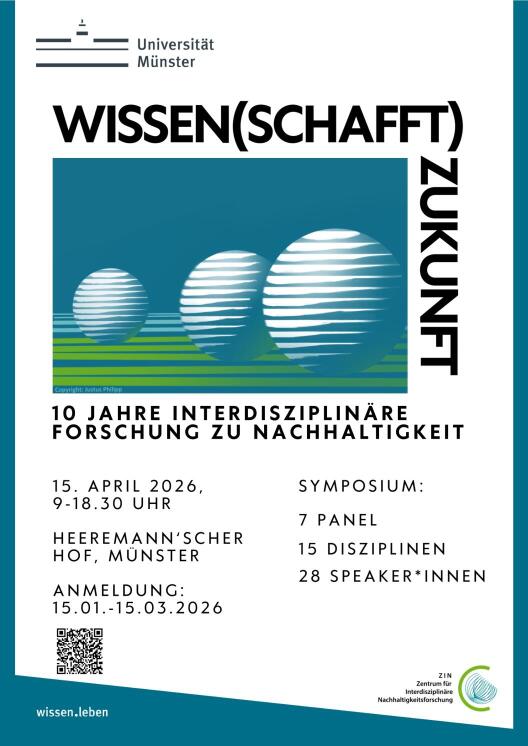
For ten years, scientists at the Centre for Interdisciplinary Sustainability Research at the University of Münster have been working together across disciplines to research and transformatively advance the transition to sustainability. The scientific conference ‘wissen(schafft)zukunft [i.e.] knowledge(creates)future – 10 years of interdisciplinary research for sustainability’ invites participants to look back on insights and developments in the context of sustainability and celebrate joint successes. After the opening and an inspiring keynote speech, six interdisciplinary and/or transdisciplinary panels will shed light on central topics of sustainability transformation. The results of these discussions will then be brought together in a synthesis discussion, before questions of inter- and transdisciplinarity, science communication and transfer are discussed in a panel discussion with guests from the university and urban society. The event will conclude with a reception, offering an opportunity for exchange in a festive atmosphere.
Space is limited. Please register for the event via this link from 15 January 2026 onwards. The registration deadline is 15 March 2026.
Talks and panels will be in German.
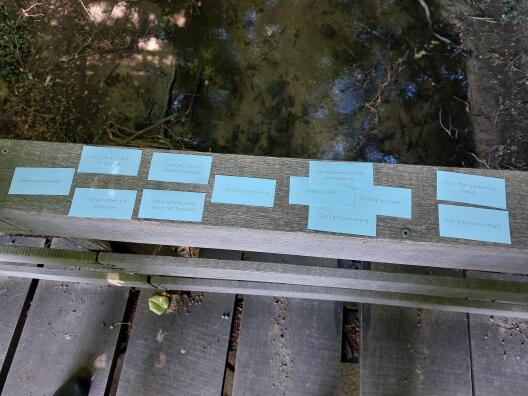
Against the backdrop of intensifying socio-ecological crises, Cornelia Steinhäuser and Jakob Kress explore the complexity of transformation processes and critically question linear concepts of sustainability. Drawing on a collaborative engagement with an artist residency, the study examines how permaculture, with its openly articulated ethical and design principles, can function as a so-called boundary object in supporting transformative processes. The paper highlights the potential of integrative real-world lab approaches for socio-ecological transformation, analyzes their temporal and methodological demands, and sheds light on how gardening and social practices rooted in permaculture can foster transdisciplinarity and community building. The findings underline how integrating scientific and artistic approaches require communicative skills, openness, and patience in order to negotiate diverse perspectives and develop shared sustainability practices.
You can access to the article here: https:// https://doi.org/10.17879/sun-2025-9217
The protection and development of the Münsterland cultural landscape is a concern that unites agriculture, nature conservation and administration. This was the conclusion reached by experts from various fields at a workshop organised by the Stiftung Lebenswerte Landschaft (Foundation for a Livable Landscape) at Gut Havichhorst near Münster. The event made it clear that there is broad consensus on the goal of preserving a liveable and species-rich landscape. The discussions therefore focused on the different perspectives on implementation: How can the economic requirements of agriculture, official regulations and nature conservation needs be reconciled?
The participants – including Prof. Dr. Tillmann Buttschardt – identified direct exchange as the most important tool for creating understanding of the respective constraints and opportunities of the other parties. In order to master the complex challenges posed by climate change, biodiversity protection and new legal requirements, it was agreed to continue the dialogue that had been initiated. The Lebenswerte Landschaft foundation will offer further formats in the future to work on joint, practical solutions for the region.
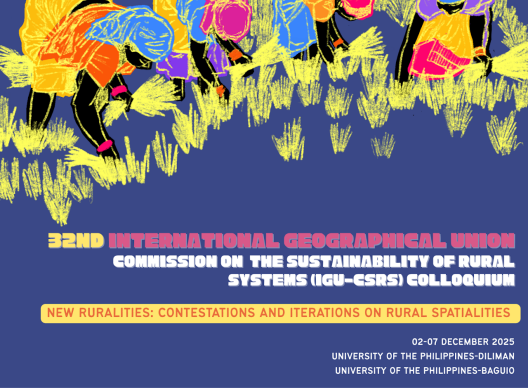
The 32nd Colloquium of the IGU Commission on Sustainability of Rural Systems, entitled ‘New Rurality: Debates and Iterations on Rural Areas,’ takes place in the Philippines from 2 to 7 December 2025. Dr Cornelia Steinhäuser, Co-Chair of the CSRS, opened the conference and will give a presentation on ‘Assessing Impact Beyond Metrics in a Creative Transition: A Living Lab Approach in an Artist Residency’.
The Commission on the Sustainability of Rural Systems (CSRS) is one of the forty commissions of the International Geographical Union (IGU). Since 1992, CSRS has endeavoured to achieve a better understanding of rural areas and of their sustainability. The conference features a combination of paper presentations and fieldwork. The first two days will be dedicated to plenary sessions and paper presentations, providing a platform for in-depth discussions on key themes. Following the conference, from Days 3 to 6, participants will embark on a fieldwork excursion in Northern Philippines.
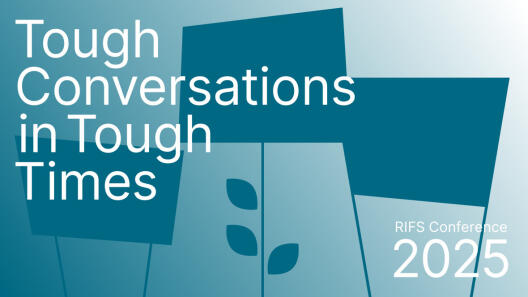
Increasingly, scholars and activists focus on justice as a means to foster the pursuit of sustainability in today’s times of populist challenges to democracy and sustainability governance. The underlying reason is the assumption that fears and experiences of the costs involved in e.g. the energy transition are the major cause of the backlash to sustainability governance. But how do such claims fit with empirical trends away from left leaning parties in many countries? If justice is such a motivating factor, why do we see support for parties and politicians redistributing resources from bottom to top? Is this a question of framing, understanding, competing objectives, or …? This roundtable aims to address this conundrum. Jointly, the inputs address the question “What are the enabling conditions of socially and ecologically just transformation in democracies materially and discursively dominated by economic elites?
Taking the need to reconfigure human-Earth interaction as a foundation, then, the roundtable discusses the material, ideational, and strategic questions associated with justice as a societal objective in the context of the current climate crisis and beyond.
Speakers:
• Johanna Siebert, Das Progressive Zentrum e.V
• Antonietta Di Giulio, Rico Defila, University of Basel
• Tillmann Buttschardt, University of Münster
• Stefan Pauliuk, University of Freiburg
• Doris Fuchs and Paula Berendt, RIFS
On 1 December 2025, DeFAF e.V. (MODEMA project) and 3N will host a conference entitled ‘Agroforestry systems as production-integrated compensation (PIK)’ at the Hanover Chamber of Agriculture. The aim is to work with all stakeholders to identify opportunities, challenges and concrete steps for implementing agroforestry systems within the framework of production-integrated compensation.
Prof. Dr. Tillmann Buttschardt will give a presentation on the topic: ‘What types of interventions can be compensated for by agroforestry systems? Ethical and legal considerations as well as the creative freedom of individual stakeholder groups.’
Further information can be found here.

Cornelia Steinhäuser and Friederike Gabel have successfully acquired the project “PerPlacsBio – Perspectives of biobased and decomposable plastics in agriculture and forestry Knowledge buildup, analysis & solutions regarding user views, product properties and competencies of companies.”
The project builds on the premise that, although the harmful effects of microplastics on ecosystems are well documented, clear information and practicable measures for agriculture and forestry are still lacking to effectively reduce such inputs. For practitioners, the currently available knowledge base is insufficient to support well-informed decisions concerning the use of (bio-)plastics.
The aim of PerPlacsBio is therefore to investigate the potential for reducing plastic use and long-term plastic persistence, while at the same time strengthening awareness and knowledge regarding the sustainable use of (bio-)plastics.
The project is conducted as a collaborative initiative. The NOVA Institute provides the foundational knowledge for decision-making, for example on the appropriate application of bioplastics, while the University of Münster and the University of Applied Forest Sciences Rottenburg take the lead in conducting surveys and interviews in the agricultural and forestry sectors. In cooperation with practitioners, industry actors and other stakeholders, the feasibility of proposed measures and alternatives will be examined and discussed through participatory formats. The results of the project will be made publicly available in a user-friendly and clearly structured database.
The project duration is two years. At ILÖK, thesis projects may be undertaken within the framework of PerPlacsBio to further expand on the research questions.
The project is funded by the Fachagentur für Nachwachsende Rohstoffe (FNR) within the funding programme “Sustainable Renewable Resources,” under the priority area “Information and Societal Dialogue on Bioeconomy and Sustainability.”
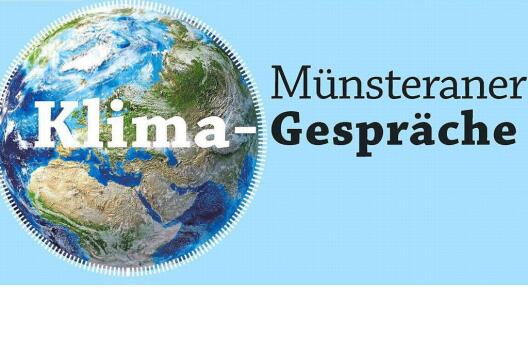
Ten years ago, a historic milestone was set in Paris: the international community committed itself to significantly limiting global warming and thus averting the worst consequences of the climate crisis. Today, a decade later, it is clear that comprehensive knowledge about the causes and consequences is available – yet our actions fall short of what is necessary.
In the Münster Climate Talk ‘10 Years of the Paris Climate Agreement – How Far Have We Come? And Why Not Further?’ on Thursday, 13 November, at 7 p.m., at the VHS Forum, Aegidiistr. 70, Professor Dr Tillmann K. Buttschardt, landscape ecologist, will provide some scientific insights at the beginning. Spokesperson for the Centre for Interdisciplinary Sustainability Research at the University of Münster (ZIN). VHS Director Esther Joy Dohmen will moderate the climate talk with him in November. Guests Dr Benjamin Brummernhenrich and Clarissa Lang from the Institute of Psychology in Education at the University of Münster, as well as students, will provide background information and, together with the audience, shed light on why the gap between knowledge and action is so wide. The discussion will focus on the question of which social, psychological and political factors have been holding us back so far – and which paths can lead to a future in which we are able to take action. According to neuroscientist Maren Urner, we must first understand what we feel and where we focus our attention before we can take social and political action. In her book ‘Radikal Emotional – Wie Gefühle Politik machen’ (Radically Emotional – How Feelings Shape Politics), she proposes a new kind of maturity test that opens up a different perspective and will hopefully spark in-depth discussions. Admission is free.

As part of the annual meeting of the Ulysseus European University, the Ulysseus R&I Conference 2025, entitled Navigating Pathways: Digital Transformation of Industry, will take place on October 20, 2025, at the Technical University of Košice, Slovakia. The Innovation Hub Social-Ecological Sustainability at the University of Münster will contribute to this event. Tillmann Buttschardt, Doris Fuchs, Cornelia Steinhäuser, Tobias Gumbert, and Daniela Pastoors (University of Münster) will present in Technical Session 3 on the topic: Co-creating Sustainable Futures: Inter & Transdisciplinary Research in Real-world Lab Context.
Ulysseus Innovation Hub Day: Connecting R&I for Digital Transformation aims to foster active collaboration among innovation ecosystems of Ulysseus partner universities and their respective regions in the topic of digital transformation of industry. The event will focus on aligning project ideas suitable for Horizon Europe calls, sharing insights on current and upcoming funding opportunities, and enabling structured networking. A strong emphasis will be placed on the role of Joint Research & Innovation Groups (JRIGs) as a foundation for developing collaborative research ideas and partnerships in the Ulysseus Community. The Working Group Ecological Planning contributes to two JRIGs.
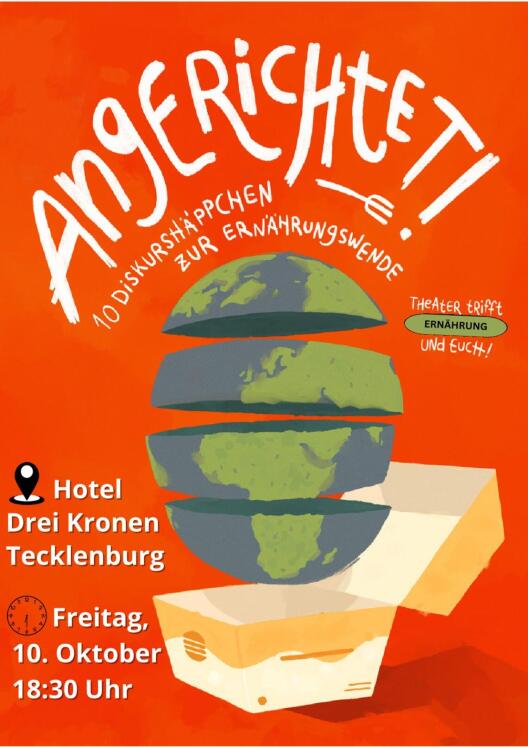
“Theater meets nutrition – and you!” With this motto, the city of Tecklenburg and its partners invite you to a special theater evening: “Served! – 10 discourse appetizers on the nutritional transition.” The performance will take place on Friday, October 10, 2025, at the Hotel Drei Kronen (Landrat-Schultz-Straße 15, Tecklenburg). Doors open at 6:30 p.m., and the performance begins at 7:00 p.m.
The evening is more than just a theater performance: With “Served!”, the city of Tecklenburg is launching the real-world laboratory project “Making the future tasty!”, which accompanies (or aims to accompany) the region on its path to a sustainable future. At the heart of the project are the tables of utopias, where sharing a meal—as a symbol of exchange and encounter—can inspire dreams and actively shape ideas for a desirable future.
At the beginning of August 2025, the peer-reviewed essay ‘Five lessons on citizen science – Insights into the methodology catalogue of the agroforestry monitoring research network’ was published in the journal Natur und Landschaft. In it, Julia Binder and Thomas Middelanis take stock of five years of practical experience in the agroforst-monitoring research network and present key findings on citizen science (CS).
The essay focuses on the tension between ‘participation, scalability and data quality’ – a supposed trilemma of CS. Based on scientific literature, practical project work and intensive collaboration with citizen scientists, the article provides well-founded insights into the development, implementation and evaluation of participatory research methods in the field of agroforestry.
The catalogue of methods presented in the essay by agroforestry monitoring serves as a practical example of successful CS projects. The article highlights the potential of citizen science, but also points out challenges – especially with regard to the scientific validation of data and the sustainable involvement of citizens in the research process. The essay is aimed at anyone who understands citizen science as a tool for participatory, transdisciplinary research and further development.
Binder, J. H., & Middelanis, T. (2025). Fünf Lektionen zu Citizen Science – Einblicke in den Methodenkatalog des Forschungsnetzwerks agroforst-monitoring. Natur und Landschaft, 100(08), 357–364. https://doi.org/10.19217/NuL2025-08-02

Living labs are spaces in which science, civil society, politics and business work together cooperatively, learn from each other, deal with challenges in a reflective manner and jointly develop and test sustainable and desirable futures.
On this day, a variety of program items will take place at three venues in Münster - including a transformative breakfast, a seminar on sustainability and responsibility, a tour with a presentation of the participating real-world laboratories and initiatives, interactive stations, time for discussions and networking over coffee and cake as well as a lecture on possible research collaborations.
The event is part of the “Open Living labs Days 2025” campaign week of the Network Real-World Laboratory for Sustainability in Germany and is organized by the Ulysseus Innovation Hub Social Ecological Sustainability and the Center for Interdisciplinary Sustainability Research (ZIN) at the University of Münster.

On June 17, it was that time again: the Ecological Planning working group met at the Wersehaus for a closed meeting. At this event, our bachelor students presented their work with inspiring talks. The topics, content and also the personal concerns, questions and sometimes also challenges behind them were given enough space to be discussed and debated in detail. Once again, it was great to gain an insight into the many ongoing projects. For the Bachelor's and Master's candidates giving presentations, it was an excellent presentation exercise and an opportunity to discuss specific questions, methodological problems, etc. in a semi-public setting. As always, the event ended with a cozy get-together with paddling & exchange and a rich and delicious buffet.
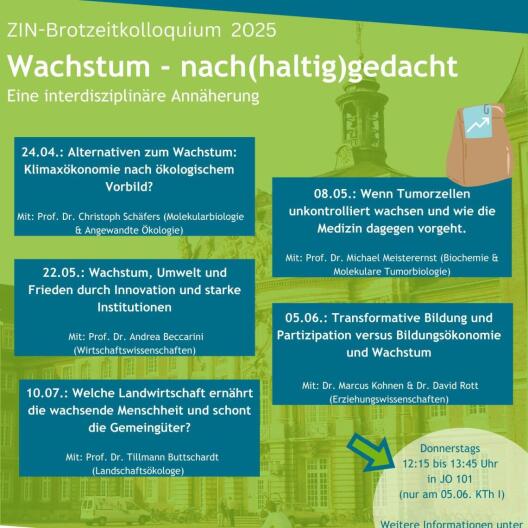
The (still) steadily growing human population seems to explain why intensification of land cultivation and growth in industrially produced (agricultural) goods is necessary. As it has not yet been possible to decouple economic growth from environmental and resource consumption, this growth is at the expense of common goods (such as soil, water, biodiversity). Exactly 500 years ago, the Peasants' War took place in Germany, triggered by the expansion of the economic desires of the landlords into the communal forests of the farming communities. Since then, the “peasantry” has been under constant pressure as land has become a commodity. The lecture will address the question of what kind of growth is possible in which farming structures if we recognize the planetary boundaries. The build-up of humus in the soil is central to this: Industrial agriculture cannot achieve this - agroecological farming can.

German-Argentinean Cooperation
We are pleased to welcome Prof. Dr. Damián Vega as a visiting scholar in the Ökoplan research group. He has been awarded an on-site fellowship by the University of Münster, funded through the Rectorate's Internationalization Fund, for the period from May 1, 2025, to July 31, 2025. Prof. Vega comes from the Universidad de Buenos Aires (Argentina) and was invited by Dr. Cornelia Steinhäuser.
Together, they aim to investigate how farmers promote health in real-world agroecosystems without the use of pesticides, with a focus on the health of the human–plant–environment continuum. Wheat was chosen as a model crop due to its importance for global food security. The health of cultivated plants is closely linked to the design and management of agroecosystems, the development of local knowledge, and the formation of social cooperation networks. This makes the use of qualitative data collection and analysis methods necessary.

New paper published:
In this study, faecal samples from ringed birds were used to investigate whether there is a correlation between the amount of microplastics eaten and the physical condition of the birds. For this purpose, the weight and wing length of the birds were measured and the faeces were examined for microplastics. Microplastics, mainly in the form of fibres, were found in almost all (98%) of the faecal samples. However, the condition of the birds was unaffected. As the birds studied were mostly migratory, the plastic fibres can therefore be transported to remote areas. The article was published in the journal Science of the Total Environment. https://doi.org/10.1016/j.scitotenv.2025.179306
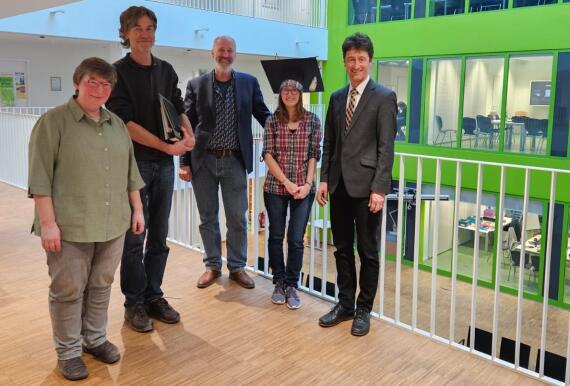
First publication in 2025:
The article, which was written by Margarete Dytkowicz together with William M. Megill (Kleve University of Applied Sciences) and Tillmann Buttschardt, examines whether beavers that have been reintroduced into the landscape of the Lower Rhine or have settled spontaneously find sufficient food in their environment and what their food preferences are. Extensive mapping work was carried out, supported by volunteers from the Earthwatch organisation, among others. The research shows that sufficient food resources are available in the study areas on the Niederrein and that calls for beavers to be hunted are not appropriate there. Rather, conflicts arise from the expansion of human utilisation claims. The article was published by Academia Environmental Sciences and Sustainability. If you would like to listen to the summary as an AI-supported podcast, you can find it here.